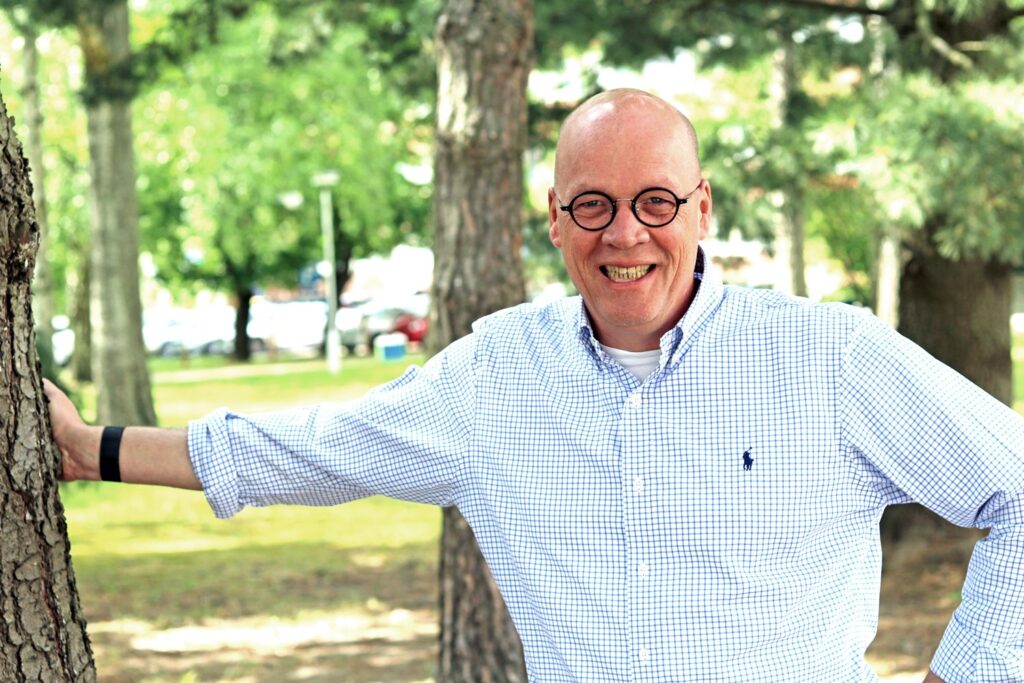Listen, listen, listen. That is how you learn about others’ needs. But according to Baptiest Mol, the KCL’s new Head of Sales and New Business Development, you cannot learn to become a salesman. You either are one – or not. Mol enjoys working with trustworthy Finns and wants to take KCL to the European market. The aim is to double KCL’s sales in five years.
What makes a great sales director? ”It starts with having, as in my new role, good listening skills,” Baptiest Mol, KCL’s new Head of Sales and New Business Development explained. ”I need to start understanding very quickly, what has made the KCL organization that it is today. I need to understand the strong points, the development areas. I need to understand from the KCL people themselves how they see and look at KCL.”
Also, customers need to be interviewed and talked to, Baptiest Mol reminded. By listening you can identify your customers’ pain points and can suggest fixes. Mol believes in natural talent. ”And it helps if you have some commercial wit, so that you smell where the money could be. I believe it’s still very much true that you cannot learn to become a salesman. You are a salesman, or then you are not,” Mol stated with a sunny smile. You need to understand where possible value can lie for the client. And then bring a solution for your customer’s problem. Even if one may not be able to learn to become a sales person, one can learn to be a better one. ”For myself, I haven’t learned it from a book. I have learned it by doing and by having worked with lots of good people. I always try to learn and absorb good ideas and approaches.”
Facing cultural differences
Throughout his career, Mol has had to adapt to different cultures. As a Dutch national, Baptiest Mol has worked in many different countries including China and India, the Baltics, Hungary, Belgium and Russia. Packaging business he entered at Stora Enso’s corrugated packaging business in Finland and during his studies he received a scholarship which took him to Russia.
Surprisingly, one of the more challenging environments for him was to work with his own country fellows in the Netherlands. Unlike in China or Russia – even if he speaks Russian – In Holland, he understands all the nuances. ”It was extremely challenging for me to deal with the fact that the Dutch people have an opinion about anything and everything. And so to reach consensus, to reach understanding of what to do or what not to do, it required a lot, a lot of talking. Patience is needed. And I’m not necessarily the most patient person,” Mol explained.
Entering a new country, Mol ”goes in blank”. He doesn’t study books beforehand about that country’s customs or behavior culture. ”Whenever there is a new adventure, I go in, as I always do. And then I observe and I listen and I make my own conclusions,” Mol said. For example, in one country, he found out that if he wants to get something done by someone in another department, you had to go through the boss. ”You cannot go to your peer in the organization and say: we have a common challenge – shall we try to find a solution”, Mol ponders. You would need to go through the superior of that person to get commitment. This is how you do and get things done in that country. ”It’s about adapting, it’s about having your antenna open, wide open to be sensitive to this type of cultural differences.” In another country, Mol thought that he had an understanding with many of his teammates. Then he found out that they were saying yes, but they didn’t do as they as they promised.
”When a Finn gives his or her word, you can consider it done.”
”They did not want me to lose my face, but neither did they want to lose theirs, so they sought consensus by saying yes. But then when I left the room, nothing happened, not what we agreed at least,” Mol remembered. Then he figured out that if you want to get something done, you need to make him or her say what you have just agreed. ”And if you do that, by them repeating what they have thought we have agreed upon, they will commit,” Mol explained.
He has enjoyed working with people in the Baltics – and the Finns, as now at KCL. ”It’s very easy, because when he or she gives his word, you can consider it done,” Mol membered. This explains why he has worked numerous times for Finnish companies and Finnish managers alike.
Into packaging by coincidence
After graduating in 1996, Baptiest Mol moved from Groningen in the Netherlands to Helsinki. Finland was climbing out of a recession. ”My wife had just started a position at the Finnish Central Bank, and we agreed that I would try to find something in Finland. I started to approach Finnish companies, but they were not really looking for a non-Finnish-speaking graduate from a business school from Holland,” Mol remembered.
The only company that invited him for an interview at that moment was a Finnish forest industry company called Enso Group, now Stora Enso. They invited him just for an interview, even if they didn’t have any positions open. Different interviews followed, and at the end he was hired in Lahti. Fun fact: the person who hired him to Enso Group was holding a vice Chairman of the Board of KCL at one point in time. Finally, they gave Mol a one-year contract, in the corrugated packaging business. Their headquarters at the time were located in the city of Lahti – which is where Mol and his family live, still today.
His first job was to map FMCG companies’ manufacturing hubs in the Pan-Baltic region of Finland, Sweden, the Baltics, the St. Petersburg area and Northern Poland. Before Enso Group acquired Tampella’s Tambox operations, Enso had only corrugated packaging operations in Finland, but thereafter the company found itself operating packaging plants in Sweden, Finland and Estonia. ”Actually, it is a pure coincidence that I entered the packaging business. I’ve stayed with it for more than 20 years,” Mol remembered. With this new adventure at KCL the circle is closing quite nicely.
Replacing Plastics, Going To The European Market
Now, in the summer of 2023, KCL has a very solid client base, mostly coming from Finland and the Nordic market. ”We need to grow, we need to expand. We want to double our sales within the next five years,” Baptiest Mol, KCL’s new Head of Sales and New Business Development proclaimed.
”We at KCL need to shout from the rooftops how good we really are”
”My role is to take all the good things that we have learned and developed in the past almost 100 years here in Finland, and take that to other markets,” Mol said. KCL’s timing could not be better, with the EU’s Green Deal Agenda and introduction of new legislation on a circular economy. KCL’s deep insight in biomaterials is truly a valuable asset in battling the climate change. At this moment everyone is working on lowering impacts on the environment. ”We at KCL need to shout from the rooftops how good we really are. When organizations are exploring new market opportunities to create new and sustainable bio-based products at a low investment risk, there is no other company that offers such a wide range of services as KCL does. I’m going to take that role.”
A reduction in or avoidance of the use of plastics is something that many of the brand-owners are working on today. ”We are going to support them in getting them up to speed this development with our research, vast amount of data and piloting expertise.,” Mol said.
Double sales in five years
In five years’, time, half of KCL’s revenues come outside of Finland. ”That’s what we’re shooting for,” Baptiest Mol, the KCL’s new Head of Sales and New Business Development proclaimed. KCL will be cooperating with clients looking for bio-based solutions, not only with the paper and board manufacturers. KCL will collaborate not only with companies that are involved with do the printing, cutting and gluing off the packages, but also with the brand owners directly. ”We see that brand owners are already interested in KCL’s experts, today.”
KCL has excellent laboratory and R&D services, but the company has also expanded in different coating applications and fibre-based packaging. KCL has lot to offer to e.g. startups, who need piloting facilities but can’t afford one of their own.
”We want to talk to the brand owners directly on what we are good at and how we can help them in the footprint reduction path, for example through re-usability and compostability,” Mol said.
”The highest brainpower in bio-based materials per square a meter in the Nordics”
After working just a few days at KCL, Mol believes that the brain power of his new colleagues per square meter is probably the highest in Finland, but maybe so in Scandinavia and even in all of Europe. ”We have such an expertise accumulated here,” Mol praised. ”I think KCL has a unique setup in skillset combined with research, laboratory and piloting activities. That’s truly fantastic!”.
Text and image: Jan Erola

